Bike Fit at Rat City Bikes
The first step in purchasing a new bicycle is to figure out what size you need.
After that, you can decide on the type (mountain, road, hybrid, cross, comfort, etc.), the color, smooth or knobby tires, your use, and other factors.
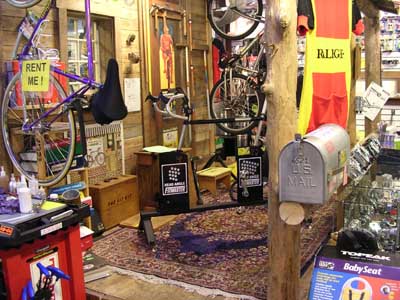
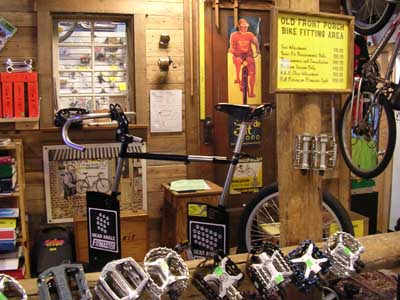
|
WE DO NOT DO RACE OR TRIATHLON FITTINGS.
We recommend Cascade Bicycle Studio or similar type shop.
What is a bike fit?
Simply put, fit is a compromise between performance and comfort. The more upright you are the more comfortable you are, but less efficient (think Dutch city bike or or Leapfrog). The more bent over you are, the more efficient you become, yet comfort is sacrificed (think Lance Armstrong). We help you find the happy medium you desire. Your body's flexability and size are the main determining factors we use along with your route and your needs & wants.
Your fit is basically the same for all bikes with slight modifications done for the specific type of bike. A new term you should become familliar with is 'Cockpit'. It is the distance from the seat to the handlebars and determines how a bike will fit you. Handlebar height also is a key factor for comfort. There are many more factors to consider but that is the basic idea. We help you find the locations you like of your seat and handlebars relative to your pedals. The frame and component sizes easily follow. There is no ONE perfect frame size for you. Everyone can ride a number of different frame sizes. Your fit may also change over time. You may start a yoga routine, for instance, which could allow you to have your bars lower than you do now. Or you may envision yourself keeping your bike for the rest of your life, in which case you would want to be able to raise your handlebars as you age. We talk about all these issues with you.
Click Here for images to help you understand better.
Some interesting articles on bike fit
(remember, these are just some experts opinion, a comfortable fit is still going to require your input):
First, we take precise skeletal measurements of your body.

- Inseam (crotch to ground)
- Thigh
- Foot
- Torso
- Arm
- Hand
- Shoulder Width
|
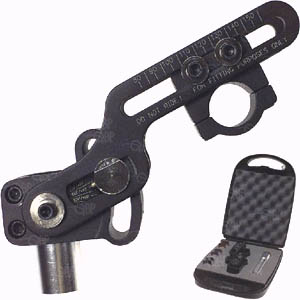
The infinitely adjustable Salsa Size-O-Matic Fit Stem
|
These measurements are plugged into the Fit Kit Pro Software to determine the ideal bike (both mountain and road) for you. We give you a computer print-out of the data. We will also measure your current bike and make recommendations for changes. We can even use the Salsa SizoMatic Fitting Stem and Fit Master Cycle to let you test ride your new fit before we order it!
If you are shopping for a new bike, then the data will help you select a perfect match from all the zillions of choices out there.
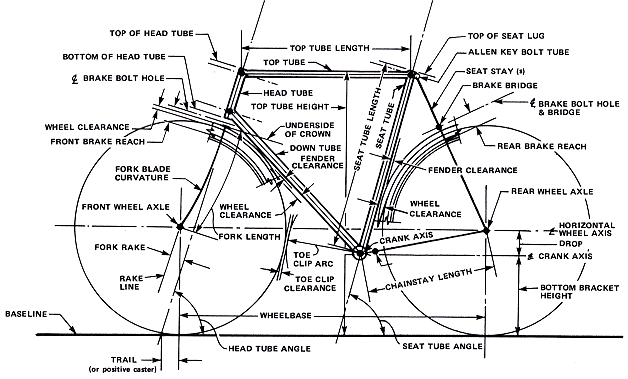
Second, we assess your flexibility and previous injuries or traumas, to help us temper the Fix Kit numbers to your needs.
Third, we give you a really cool, color print-out of the perfect bike for you! Click here for a screen shot
Lastly, we put you on your bike and look at you to see if all is right. We may have you ride on a stationary trainer and make minor adjustments. You will need to ride your bike for a time to see if it is comfortable. We work with you on any changes you may need/want afterwards.
What makes a bike fit correctly?
First, ignore seat tube length! Bikes are usually 'sized' by the seat tube length. This really has nothing to do with how a bike will fit.
The most important measurements are Top Tube Length, Stem Length & Height, and Seat Tube Angle. They determine how you will sit on the bike and how far away the handlebars will be.
Other measurements like, Head Tube Angle, Chainstay Length and Wheel Base will determine how the bike handles, but really have very little to do with a comfortable fit.
Most bike frames are made for the 'average' male body. This can make it hard to get a good fit for a woman or a man with a slightly different body.
Many men, like the average woman, have longer legs than 'normal' and may need a tall stem to bring the bars up into the comfort range. If they rode a bike based solely on their leg length, then the bars would be too far away. The stand-over test is hardly adequate for getting a good fit. Remember, SEAT TUBE LENGTH HAS VERY LITTLE TO DO WITH BICYCLE FIT.
|
Another area of fit that is often overlooked is Cleat Position. With the Fit Kit R.A.D. (Rotaional Adjustment Device) Pedals we can biomechanically position your cleats to eliminate stress on your ankles, knees and hips. Fore-aft, Side-to-side and Rotation positioning is also done. This adjustment is so important that we will not install cleats with less than 10 degrees of float with out a R.A.D. This includes all Shimano SPD (4 degrees), Wellgo (4 degrees), Ritchey (4 degrees), CODA (4 degrees) and other SPD copies, Look and most other road pedals. Crank Brother's (20 degrees circle cleat on left shoe, 15 degrees circle cleat on right shoe), Speedplay Frog (20 degrees) and Time ATAC (15 - 20 degrees) pedals systems make the R.A.D. unnecessary, however, it can still be done to center you in the middle of the float. Float is good, therefore, we always recommend Speedplay or Time as your first choice. Speedplay pedals are by far the easiest to enter and exit and the lightest mountain bike style pedal out there!
We do not stock road style shoes and pedals. Why wear a shoe you can't get off and walk around in? Makes no sense, except for racing. If you race we can special order you any Shimano shoe we don't carry. The fit will be the same as a walkable shoe because all Shimano shoes are built on the same last.
We also now offer Bike Fit Cleat Wedges (formerly known as Big Meats or LeWedge) cleat foot-cleat alignment wedges.
|
XXXX |
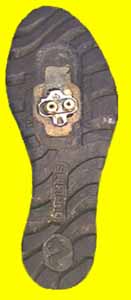
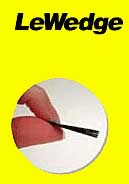
Above is an actual cleat adjustment we did for a woman. She had a tight iliotibial (I.T.) band and it caused her heel to move toward the center of the bike. This required the cleat to be adjusted at an angle. There is no way you could trial-and-error this position accurately!
|
| Package |
What You Get |
Price |
When to Use |
| Seat Adjustment |
Inseam, Thigh and Foot Measurements
Fore-Aft Adjustment of Seat |
Price |
Buying a New Seat |
| Measurements ONLY |
Print-out of your Skeletal Measurements and the Geometry of the Perfect Bike for you! |
Price |
Looking for a New Bike |
| Measurements and Consultation |
Print-out as above and take measurements of your current bike and/or compare the geometry of a new bike to your body and make recommendations. Also includes assessing your position while on the bike. |
Price |
To fit your current bike or if you want to see if a particular bike will fit you. |
| Fit Stem Session Only |
Stem & Handlebar Fit Analysis and Adjustment with Salsa Fit Stem* |
Price |
Wanting to test and fine-tune your stem position.
Up to an hour with personal fit expert |
| Cleat Adjustment (R.A.D.) |
Bio-Mechanical Positioning of Pedal/Shoe Cleats using the Rotational Adustment Devices |
Price |
New Pedals or Shoes** |
| Le Wedge |
Pronate / Supinate Positioning of Cleats using the Le Wedge Cleat Shims |
Price |
Lessens stress on joints. |
| Full Bike Fit |
- Body Measurements
- Print-Out
- Seat Position Adjustment
- Stem & Handlebar Fit Analysis and Adjustment with Fitmaster Cycle*
|
Price |
New Bike Set-Up |
*Labor to change bars or stem Extra
|
|
**We do not install cleats on shoes without a RAD adjustment.
|
|
|
XXXX |
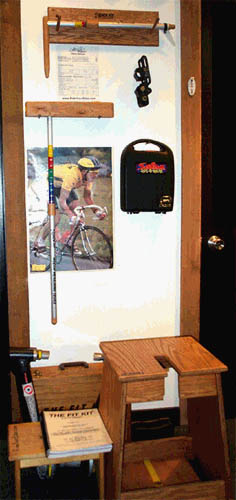
|
There are many different types of bicycles besides "Road or Mountain"
. More information is on our Bicycles Page.
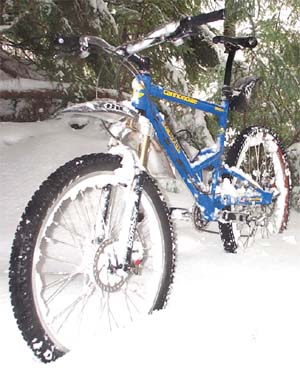
Bicycles are an amazing value today. When you consider all the man(person)hours involved in the manufacture of a bike it is staggering! There are AT LEAST 250 people that touch your bike before you! This doesn't even consider the people involved in designing your bike.
The humble bicycle mechanic is the last, but most important person to touch your bike. A bike comes from its maker only partially created (80% assembled). Most retailers just finish the process in as little time as possible. The bikes are not always assembled by a qualified, experienced mechanic.
As our name suggests, ABR only employs experienced bicycle mechanics. Each of our mechanics has OVER 10 years bike repair experience!
We take about 2 hours to finish the assembly of your new bike.








